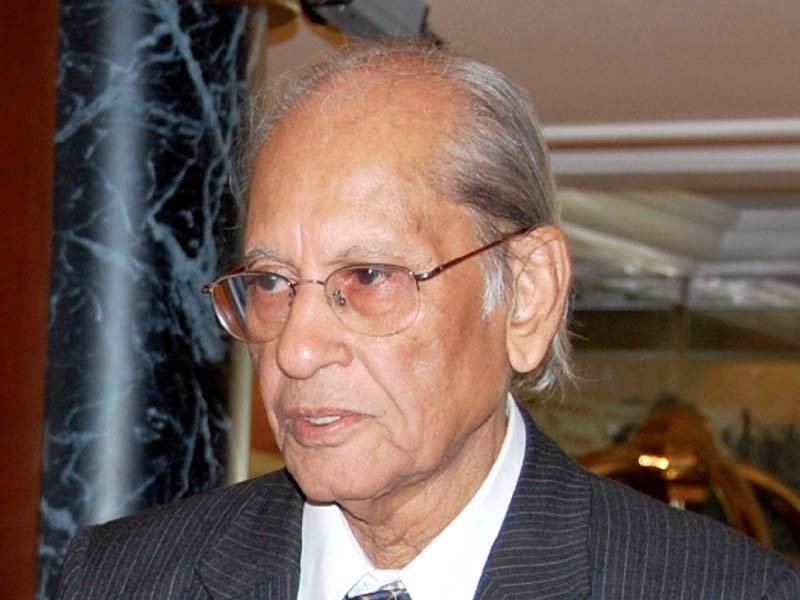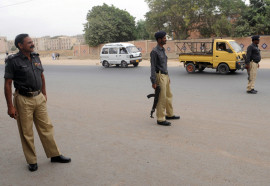
Dr Aslam Farrukhi, who died in Karachi on Wednesday, was our teacher of Urdu at the Karachi University in the 1970s. We have seen him overtaken by moments of ecstasy when teaching Sauda's Qasida Tazheek-i-Rozgar (Ridicule of Time). Enjoying and lost in its diction and syntax, he charmed us into believing that it was a narrative and description of everything that was going wrong in our present day society.
Born on October 23, 1923, in Lucknow in a literary family hailing from Farrukhabad, Aslam Farrukhi was an outstanding authority on Urdu language and literature and spent all his life in the teaching profession and research except for a short period of six years when he was associated with Radio Pakistan. His father, Ahsan Siddiqui, was also an author and writer of good repute. Dr Farrukhi was married to Taj Begum Farrukhi, great grand-daughter of Deputy Nazir Ahmad, and a niece of Shahid Ahmad Dehlavi. She is also an educationist and retired as Principal of Korangi IV College for Women.
Dr Farrukhi completed his school education in India and after the partition he, along with his family, migrated to Pakistan in September, 1947, and settled in Karachi. While working at Radio Pakistan, he continued his higher studies and completed his Master's in Urdu from the University of Karachi (He had the distinction of being part of the first batch of the University of Karachi). After leaving Radio Pakistan, he served at Sindh Muslim College and Government College for Men as a lecturer before joining the Urdu Department of Karachi University. In his long association with the university he also served as registrar and director for the Bureau of Composition, Compilation and Translation.
Dr Farrukhi earned recognition as a researcher and scholar after he was awarded PhD by the University of Karachi in 1962. His thesis was on the life and works of legendary Urdu stylist, Muhammad Hussain Azad.
Known and acknowledged for his magical diction, syntax and allegorical writings, Muhammad Hussain Azad, is one of the most enigmatic figures of Urdu Literature. His Aab-i-Hayat, a chronicle of life and works of Urdu poets, has continued to fascinate generation after generation despite its historical inaccuracies and personal biases and prejudices of the author. Dr Farrukhi's thesis — Muhammad Hussain Azad: Hayat-o-Tasanif — is definitely an improvement upon earlier researches on the subject and it tries to dispel many misgivings about the legendary writer.
Azad, however, left some lasting impressions on Dr Farrukhi and the great master of Urdu prose became a constant source of inspiration for his own creativity and style of writing. We can easily find traces of Azad's influence on Dr Farrukhi's works, especially in the portraits and sketches of poets, scholars and academicians, he wrote. His book, 'Saat Asman', containing the literary portraits of seven classical poets of Urdu and two other books of sketch writing — Aangan mein Sitarey and Mausam-i-Bahar Jaisay Log — are living testimony to the influence of Azad's art of creating a symphony with the choice and arrangement of words. Aslam Farrukhi also edited some other works of Azad which included Nairang-i-Khayal and Qasis-i-Hind.
It was probably under the influence of another saintly scholar, Dr Ghulam Mustafa Khan, that Dr Farrukhi developed a keen interest in Islamic mysticism. This led him to fall in love with Khwaja Nizamuddin Auliya (1238-1325), one of the most revered saints of the Subcontinent. He wrote no less than six books on the life and teachings of the great saint, whose charisma and hold over the people of Muslim India was envied by successive rulers of Delhi. These books, claimed Dr Farrukhi, bring 'Sultanji' (as Khwaja Nizamuddin was lovingly called by his disciples and devotees) back to life and "you see him walking and talking amid you." He also wrote a book, Fareed-o-Fard-i-Fareed, on Baba Fareeduddin Ganjshakar, the spiritual guide and mentor of Khwaja Nizamuddin.
Dr Farrukhi was also a poet but refused to 'acknowledge' himself as a poet. "I am known neither for my poetry nor for my research work. My identity lies in portrait and sketch writing and more than that for the writings I did about Sultan al-Mashaikh (Nizamuddin Auliya)," he once said.
Published in The Express Tribune, June 16th, 2016.


1716998435-0/Ryan-Reynolds-Hugh-Jackman-(3)1716998435-0-165x106.webp)












1730706072-0/Copy-of-Untitled-(2)1730706072-0-270x192.webp)
COMMENTS (3)
Comments are moderated and generally will be posted if they are on-topic and not abusive.
For more information, please see our Comments FAQ